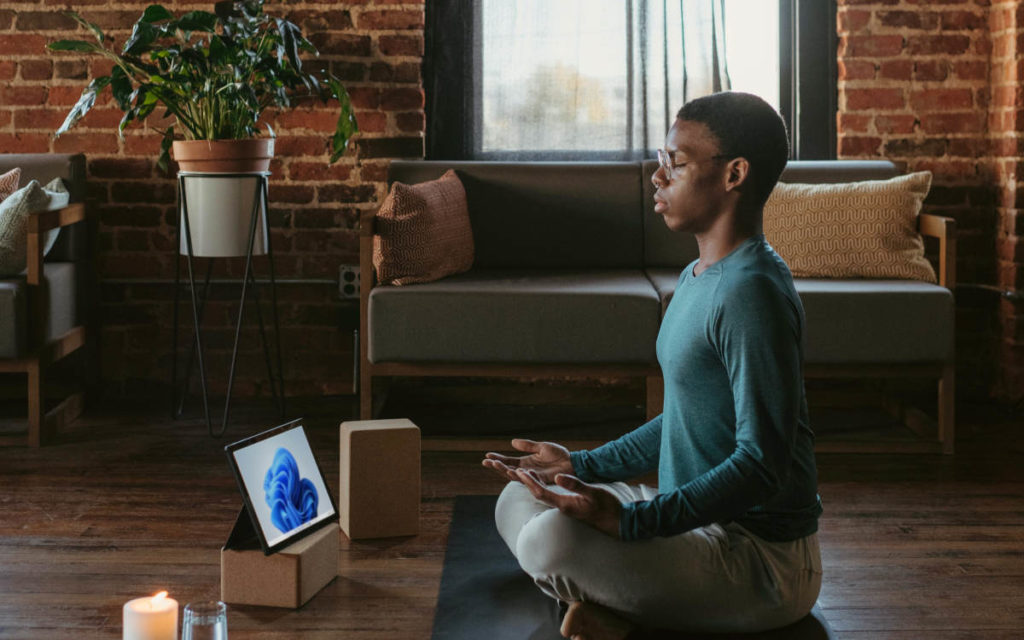

Section

Back
Meditation and Memory: The Surprising Connection
02/07/2022 | Written by Vic Shayne
Conscious Healthy Living

Without memory, there is no recognition of either past or present; there is only the eternal “now” as experience. While this may seem like a blissful reality, it’s wholly impractical for this human experience in which we require memory for learning, finding our way home, recognizing our friends and relatives, and learning from our mistakes. Luckily, the ancient relaxation practice of meditation and memory are closely linked.
Bringing the mind to “now” offers many benefits, including restoring physical and emotional balance, increasing and retaining memory, and improving cognitive health. To achieve any benefit, it’s best to first know what it is you want out of your meditation, whether it’s to build a better memory, relieve stress, or find your true nature. To identify your interests helps focus your attention on your practice.
There is no right or wrong type of meditation. The purpose of this natural age-old practice that spans the globe is multifold, although the most common type includes sitting in a lotus position to focus on the breath, clear the mind, and find inner peace. Some meditation is performed in motion, such as during yoga, qigong, or Tai chi practice. There are walking meditation methods alongside the classic sitting practices.
Foundations of Meditation
The practice of meditation in the Western world has often been attributed to teachings from the East. However, all Western religions have meditative sects that go beyond mere doctrine. Islam has Sufism, Judaism has Cabalism, and Christianity has Christian mysticism. But the Eastern religions are steeped in mysticism and meditation as an integral part of Buddhism, Taoism, Hinduism, and so on.
Generally speaking, meditation takes you out of the ordinary and into a state of self-contemplation. In fact, the Eastern traditions of Advaita-Vedanta teach self-enquiry meditation, which has to do with turning the mind inward to discover its source. This particular form of meditation is meant to lead to self-realization, or enlightenment, and has little to do with making you a better or calmer person.
Meditating to achieve improved cognition is both an art and a science.
While meditation can be taught as a system with step-by-step instructions, it is also a naturally flowing process that is individualistic and expressive. This combination enables you to use meditation personally, to find what you are looking for — whether it’s to become a better person, find answers to your problems, or find more enjoyment and productivity out of life.
Meditation and Concentration
Cognition is basically a mental action or process of acquiring knowledge and understanding through thought, experience, and the senses. In certain schools of thought that have depended upon memorizing a great number of sage teachings and sutras, meditation has enabled greater retention of information and oral transmissions passed along to disciples and down through generations.
Neuroscientist Richard Davison has been studying the effects of meditation for decades at the University of Wisconsin. He has found that meditating upon compassion actually increases the size of the brain, as well as gamma waves that lead to greater capacity for learning, better memory, and improved focus.
Buddhist monk Matthieu Ricard, who has been dubbed the happiest man alive, explains that human beings need regular meditation practice, “just as plants need watering.” Ricard has been the subject of many scientific experiments showing increased brain plasticity and function through his meditative practice.

Meditation and Memory
Researchers at the University of California, Berkeley, have shown that mindfulness meditation has the capacity to improve short-term memory. One of the main problems with holding onto newer ideas and teachings is something called “proactive interference,” wherein prior memories interfere with your ability to retrieve more recent information from your memory stores.
This is especially challenging for older people and those suffering from mental illness. Berkeley had subjects engage in mindfulness meditation, spending two weeks learning to focus on their breath or bodily sensations as well as two weeks learning to be aware of what was happening around them. The mindfulness subjects showed significantly less proactive interference and therefore showed improvement in short-term memory.
Jonathan Greenberg, lead author of the Berkeley study cited above, explained, “When you try to learn something new, it’s difficult to do it because you have all these past memories that interfere…It makes a lot of sense that mindfulness might improve that, because the tendency to attend to the present moment is a core concept of mindfulness.”
Buddhist Meditation and Memory
In 2009, a group of researchers led by Maria Kozhevnikov, George Mason University, investigated claims by Tibetan Buddhists that meditative techniques can enhance not only overall mental functioning, but also specific cognitive processes such as attention, perception, or mental imagery.
A number of Buddhist monks have noted that accomplished practitioners have developed exceptional imagery skills — to the extent that they are able to maintain complex religious images in visuospatial-working memory for minutes, sometimes hours, without noticeable degradation. On the other hand, psychologists were skeptical, saying that maintaining an image for such a long time is impossible, because images fade in seconds due to self-limited memory resources.
In the final analysis, researchers discovered that at least one type of meditation — deity yoga — specifically trains a person’s capacity to access heightened visuo-spatial memory resources. Deity yoga is a practice that helps the meditator identify with a specific enlightened being to realize one’s innate Buddha nature. This is done through visualization, chanting, mantra recitation, and meditation, with focus on a deity, and in many practices, visualize oneself as that deity, non-dual with them.
Ayurvedic Herbs That Support Memory
Meditators from the most ancient traditions of India have discovered that certain herbs enhance the memory and sharpen the mind. Among these are Ashwagandha, Gotu Kola (Brahmi), Bacopa, and Shankhpushpi. Fortunately, the most natural versions of these herbs are still being used, not only for the mind, but also the health of the body. Before or after your next meditation session, try sipping on ashwagandha tea to help ease any stressors.

Simple Meditations for Memory and Relaxation
The best two types of meditation for peace of mind, increased memory, and generalized well- being of mind, body, spirit, and emotions are loving kindness (metta) and mindfulness meditation.
- Technique One. If you are new to meditation, welcome aboard. It’s as easy to do as breathing. For mindfulness meditation, just find a quiet, comfortable place, sit upright in a chair or on a mat or the floor, and close your eyes. Don’t try to control your thoughts or your mind. Just sit quietly and pay attention to your breathing as it gently goes in and out. If your mind wanders, which it is certain to do, just bring your attention back. Don’t stress over it. And if you get drowsy and fall asleep, that’s okay, too, because it takes a little bit of practice to increase your awareness. Tomorrow you can just pick up where you left off.
- Technique Two. For loving-kindness meditation, simply get comfortable (as described above), and focus upon showing love and compassion toward those closest to you in your life. After this, imagine doing the same for friends and those whom you like. Then, offer this compassion to strangers, and finally to those who may even be problematic or unkind. This doesn’t mean you have to like everyone, but merely that you want to add love to the world to uplift it and the lives of those within it.
In the least, regular meditation reduces stress, and less stress means a better memory, a healthier body, reduced inflammation and anxiety, better focus, and a more astute mind. And at best, meditation will bring you into a state of renewed wonder and appreciation for life in all its expressions and beyond.
To add some breathing techniques to your practice, try out this home pranayama meditation for stress relief.





